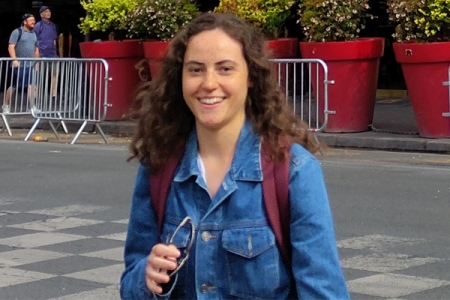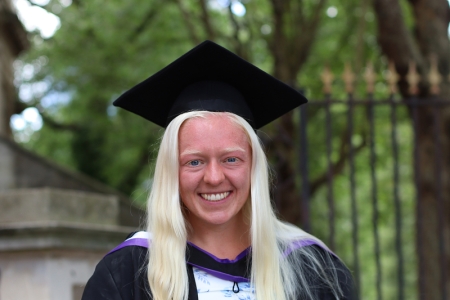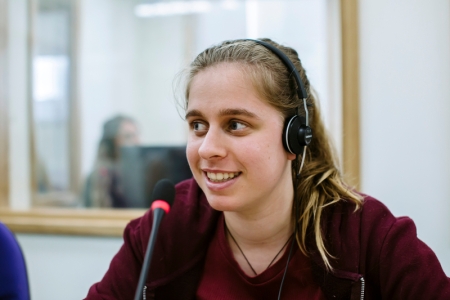
Key information
UCAS code:
Q301
Typical offer:
104-112 UCAS points to include a minimum of 2 A levels, or equivalent, to include a relevant subject
Showing content for section Overview
Overview
If you want a future with fewer limits, this is the degree for you. When you study English Literature at Portsmouth, you'll also explore history and politics, society and culture, human relationships and identities, and how we choose to live. And you’re doing it in a city steeped in lively literature, from Charles Dickens to Neil Gaiman.
You’ll explore complex, challenging issues – from masculinity to the Holocaust. You’ll learn the skills to critically analyse the purpose, truth and impact of any written text. You’ll also develop the skills to produce your own writing and presentations, so you can communicate original ideas in ways that engage and influence readers.
The combination of creative thinking and rigorous analysis you develop will make you a compelling candidate for all kinds of jobs – from marketing to museums, and journalism to publishing.
Course highlights
- Discover our literary city with the constantly evolving Portsmouth Literary Map – your course begins with a tour of literary Portsea and the Dockyards area, introducing significant places in the lives of Charles Dickens, Jane Austen, Neil Gaiman, Simon Armitage, today's local writers, and plenty more
- Enjoy the freedom to interpret assignments creatively, and develop employable skills in presentation and teamwork, on a course without exams
- Learn directly from staff who produce world-leading research into areas as diverse as magical realism and representations of food
- Build specialist knowledge by choosing the topics that match your interests – from global literature to dystopian and apocalyptic environments, from women’s writing to crime writing
- Develop your own style and build up your writer’s portfolio by becoming a contributor to our Writing Literary Portsmouth blog
- Learn what makes a winning book, from the Man-Booker to the Nobel Prize
- Curate your own literary prize or produce a prize pitch, to experience what happens when writing meets the commercial marketplace
- Build a professional network with high-profile figures including authors, agents, publishers, booksellers, prize judges and critics through our contacts and partnerships
- Have the opportunity to do a work placement year after your second or third year on this Connected Degree - we're the only UK university to offer flexible sandwich placements for undergraduates
- Choose to learn a foreign language for free as part of your degree, from a selection of Arabic, British Sign Language, French, German, Italian, Japanese, Mandarin or Spanish
100%
of graduates in work or further study
(HESA graduate outcomes survey 2020/21)
100%
of students said teaching staff were very good or good at explaining things
(NSS 2023)
Take a literary history tour of Portsmouth with us
From Charles Dickens and Sherlock Holmes to Neil Gaiman, Portsmouth is steeped in lively literature. Join two of our students for a tour around our literary city.
Chibuzor and Holly: Welcome to Portsmouth.
Chibuzor: Our island city has a really rich history of literature and culture.
Holly: Come and join us for a tour.
Chibuzor: One of our most famous literary residents is Charles Dickens, who was born here on Old Commercial Road. It is now home to the Charles Dickens Birthplace Museum.
Holly: Portsmouth is also the birthplace of another famous figure. Arthur Conan Doyle wrote his first Sherlock Holmes story while practising as a doctor here in Southsea. Now you can walk in his footsteps while doing a spot of shopping on Elm Grove.
Chibuzor: Thinking of shopping, our popular Gunwharf Quays features in Graham Hurley's DI Faraday crime novel, The Take. Graham Hurley is a friend of the English Literature programme. If you study with us here at the University of Portsmouth, you may get a chance to work with him in class.
Holly: There is literally an ocean at the end of this lane. It was renamed in honour of the famous novel by Neil Gaiman, who lived just outside of Portsmouth and spent many holidays here with relatives in the city.
Chibuzor: As an island city, Portsmouth has had a huge influence on authors both from home and abroad. Jane Austen often visited here to see her brothers, who were stationed here with the Royal Navy. She was inspired to include Portsmouth in her novel, Mansfield Park.
Holly: Stephanie Norgate's poem, Ferries at Southsea, was inspired by the view of ferries here on Clarence Parade Pier. Her poem is strongly rooted in the local area, but also tackles global issues of immigration.
Chibuzor: Portsmouth’s naval history means we can't shy away from the topics of race and slavery. The first slave narrator, Ukawsawa Gronniosaw, visited our city, while John Jea, another former slave, was a prominent preacher near the docks. Their memoirs movingly reveal the city's black history.
Holly: As we move into modern day, we have authors and poets tackling issues both big and small. Poet laureate Simon Armitage studied at the University of Portsmouth. Local poet Denise Bennett has written on Portsmouth Jewish history, and Fatima Bhutto featured Portsmouth in her contemporary novel on Islamic culture. As well as its fabulous literary history, Portsmouth also has a really vibrant, creative writing community, and you can be a part of it if you decide to study here.
Chibuzor: Our final stop is Milldam building. Originally a mill pond, it was featured in a long forgotten novel by Walter Besant, who was a contemporary of Charles Dickens. The Navy drained the pond and built officer quarters here. Then it changed hands and became home to the English Literature team at the University of Portsmouth.
Holly: Which means Portsmouth is home to the next generation of writers, thinkers and world shapers.
Chibuzor: We hope you join us.
Contact information
Contact AdmissionsEntry requirements
BA (Hons) English Literature entry requirements
Typical offers
- A levels - BBC-BCC
- UCAS points - 104-112 points to include a minimum of 2 A levels, or equivalent, to include a relevant subject (calculate your UCAS points)
- BTECs (Extended Diplomas) - DMM
- International Baccalaureate - 25
You may need to have studied specific subjects – find full entry requirements and other qualifications we accept
English language requirements
- English language proficiency at a minimum of IELTS band 6.0 with no component score below 5.5.
See alternative English language qualifications
We also accept other standard English tests and qualifications, as long as they meet the minimum requirements of your course.
If you don't meet the English language requirements yet, you can achieve the level you need by successfully completing a pre-sessional English programme before you start your course.
Typical offers
- A levels - BBC-BCC
- UCAS points - 104-112 points to include a minimum of 2 A levels, or equivalent, to include a relevant subject (calculate your UCAS points)
- BTECs (Extended Diplomas) - DMM
- International Baccalaureate - 25
You may need to have studied specific subjects or GCSEs - see full entry requirements and other qualifications we accept.
English language requirements
- English language proficiency at a minimum of IELTS band 6.0 with no component score below 5.5.
See alternative English language qualifications
We also accept other standard English tests and qualifications, as long as they meet the minimum requirements of your course.
If you don't meet the English language requirements yet, you can achieve the level you need by successfully completing a pre-sessional English programme before you start your course.
We look at more than just your grades
While we consider your grades when making an offer, we also carefully look at your circumstances and other factors to assess your potential. These include whether you live and work in the region and your personal and family circumstances which we assess using established data.
Optional pathways
After you start this course, you can choose to modify the qualification you graduate with. If you combine your literature studies with an interest in history or the media, you could graduate with a customised degree:
How studying English Literature helped my career
Alumnus Nelson Hylton talks about how his English Literature course at the University of Portsmouth helped his career as a presenter at BBC Radio 1.
Nelson: When I was leaving sixth form, I wasn't exactly entirely sure what I wanted to do with my life. But, I knew that I loved reading and I loved writing, like, I spent so much time reading books and for me, it was the wide variety of literature that made me want to study at Portsmouth.
There were certain elements of the course where we'd have to do presentations and speak publicly, and that obviously helped me a lot with what I do now, speaking to thousands of people on air. But I'd says as well, the course helped me become more confident in my ability, speak to people and communicate my ideas and values across them so it helped me in a few different ways for sure.
Why Portsmouth? I would say there's so many different varieties of activities, be it, you know, radio or American football and the fact that you can take part in so much more than just your course.
I think some of my course lecturers were some of the best in the country, you know? They were great. They've worked really hard in helping me achieve my dreams.
Any university student is going to have ups and downs whilst they're at university, and the pastoral care and support from Portsmouth is second to none. They really help me and they really looked after me.
I would definitely say English literature does link to what I do now as a radio presenter because a lot of it is storytelling, trying to allow the listener to believe exactly what I believe and trying to guide them on this journey. I think those are all skills that I've picked up when formulating arguments in essays. It's helped me so much.
Careers and opportunities
Why study English literature? There are many reasons, but one of the best things about an English literature degree is that it draws on many diverse skills and ways of thinking critically.
This makes English literature one of the most versatile subjects you can study, creating a wealth of career opportunities.
This English literature degree will set you up to pursue careers in fields where communication and critical thinking matter. We outline some of these below, but employers in many more industries recognise the value of the transferable skills you’ll gain by choosing to study English literature. Your CV will demonstrate:
- sophisticated analytical skills, enabling you to assess texts on any topic
- the ability to think critically and reach your own independent conclusions
- a flair for presenting and discussing ideas with diverse audiences
- the confidence to say exactly what you mean to say, in writing and in person
- a creative mindset that helps you see things differently and solve problems
- a well-developed sense of empathy and teamworking skills
Take a look at our blog to find out more about the jobs you can get with an English literature degree.
The major problems of today are all based around the interpretation of texts – how do we identify ‘fake news’ and misinformation? How do people persuade others of a point of view? How have writers imagined the end of the world, and how do these narratives shape reactions to global dangers?
Being able to read between the lines has never been more important, and an English literature degree gives you the tools to do exactly that.
What areas can you work in with an English literature degree?
After the course, you could work in areas such as:
- advertising
- journalism
- arts and media
- public relations
- copywriting
- teaching
- research
You could also study at postgraduate level.
Graduate destinations
Roles our previous English literature graduates have gone onto include:
- copywriter
- journalist and editor
- marketing executive
- teacher
- paralegal
- sales executive
- museum curator
What jobs can you get with an English literature degree?
Read our blog to find out more about how versatile this degree really is.


Meet BA (Hons) English Literature graduate, Sophie Stevens
Hear from BA (Hons) English Literature graduate, Sophie Stevens, who's since embarked on postgraduate study and the British Council - Teaching English Abroad scheme.

Ongoing career support – up to 5 years after you graduate
Get experience while you study, with support to find part-time jobs, volunteering opportunities, and work experience.
Towards the end of your degree and for up to five years after graduation, you’ll receive one-to-one support from our Graduate Recruitment Consultancy to help you find your perfect role.
Placement year (optional)
After your second or third year of study, you can choose to do a paid work placement year in the UK or overseas. This lets you put your new skills to work while developing valuable links with employers.
It’s fantastic for your CV and will really help you stand out when applying for jobs after graduation.
We’ll help you secure a work placement that fits your aspirations. Mentoring and support throughout your placement will help you to get the most from the experience.
Previous students have secured placement positions at organisations such as:
- British Council
- Kings Theatre Portsmouth
- Ghent City Council, Belgium
- Centerprise International – an IT solutions provider
- Hays Recruitment
- local schools
You could also choose to set up your own business, or take a voluntary placement.
Studying abroad
You can choose take part in a study abroad experience with one of our partner universities:
- Ghent University, Belgium
- Kiel University, Germany
- University of Luxembourg
- University of Malaga, Spain
You could also secure funding from the Turing Scheme to study abroad at one of our partner universities.

The English Literature course at the University of Portsmouth has been the best learning experience I've ever had.
I was continually offered new and unique literary perspectives from expert lecturers who gave me the upmost support and encouragement throughout.
Modules
Each module on this course is worth a certain number of credits.
In each year, you need to study modules worth a total of 120 credits. For example, four modules worth 20 credits and one module worth 40 credits.
Not a fan of exams?
On this course, you won't have to sit any exams. Instead, you'll submit coursework, assignments and presentations to demonstrate your knowledge. Take a look at how you'll be assessed on this course.
What you'll study
Core modules
You’ll investigate ideas of the body as ‘natural’ by examining its role in culturally constructed ideas of gender, race and sexuality.
You’ll explore how the body can be seen as the site of both conformity and resistance, identification and otherness.
Get an introduction to theoretical approaches to reading the body in literature, such as gender theory and posthumanism, as well as key terms and concepts, including queer, abject and grotesque.
You’ll complete the module viewing the body as a lightning rod for questions of belonging, power and social change.
Immerse yourself in world literature classics and modern texts written in English or translated from other languages. Analyse stories that address shared human concerns like environment, power, ethnicity and gender.
You’ll discover how reading diverse voices fosters a spirit of intellectual curiosity, and discuss and debate literature’s role in an increasingly connected world.
In this module, you'll dive into theories and debates challenging assumptions about artistic quality.
Through key texts spanning from the 19th century to the present day, you'll uncover the contextual forces and power structures influencing critics.
You’ll shed new light on popular fictions' literary functions and cultural impacts, and sharpen critical thinking skills to form educated opinions on what compelling storytelling means to different communities.
Through diverse works, you’ll develop your ideas and apply new concepts, including narrative theory that helps you understand how stories are constructed, and can spark your own literary creativity.
You’ll take part in lectures and group discussions to debate genres and conventions. You’ll nurture your critical awareness, research skills, and essay management, preparing you to examine life’s mysteries through storytelling.
This module will also set you up with all of the referencing skills you'll need to navigate the rest of your degree.
You'll explore fundamental assumptions about what it is to read, write and interpret texts, using select literary texts to examine the links between literature and theory, and to produce increasingly critical and complex readings.
This module will help you get to grips with concepts and ideas that will be crucial to your study of literature throughout your degree.
Core modules
You’ll analyse diverse literary prizes – from the Booker to the Women’s Prize and beyond – and debate the complex criteria applied in judging literary value.
This module gives you access to the commercial world of literary publishing and prizes, offering you the chance to develop professional skills and plenty of opportunity for literary analysis
You’ll use case studies and exercises to see how research develops from initial ideas to finished works.
You’ll review resources and arguments to improve your research skills, and work with other students to refine your dissertation proposal through feedback and peer review.
This module will also help enhance your employability skills through bespoke activities and assessment.
Optional modules
You'll analyse key crime writing texts from detective fiction to philosophical writings on crime and punishment, considering the way they represent criminals, the police, the ethics of the death penalty, as well as historical contexts and theoretical approaches.
This module invites you on an investigative journey through the ethics, identities and politics underpinning tales of crime.
You’ll discover how literature draws on our modern anxieties around climate change, as well as our conflicted relationship with nature, and helps us address these issues.
By investigating the methods and motivations behind ecocritical approaches in literature, you’ll consider the ways in which ecocriticism, ecofeminism, and postcolonial ecocriticism can be used to focus on issues of ecocrisis, environmental justice, sovereignty and power.
There’s also a strong focus on gender, identity, the body, and the relationship between humans and environmental others.
You’ll look at diverse genres that shed light on historical moments such as slavery, post-colonialism, suffrage, second wave feminism and post-feminism.
You’ll analyse how transnational and gender identities are constructed and expressed in a global context, honing skills for contextual literary analysis alongside independent research.
In this module, you’ll explore European colonisation of Africa, asking questions like - how did they justify colonial rule, and how did African peoples respond to these colonisers?
You’ll learn how, after World War II, colonial rule was increasingly challenged from both within the empire, by growing African demands for political rights, and in the international arena, with the global trend towards trusteeship, development and self-determination.
You’ll also explore European relations with Africa in the post-colonial era, looking at themes which may include ideas about civilisation, universalism and race, modern attempts to 'rehabilitate' empire in the media, and the legacies of colonialism in Britain, Europe and Africa.
You’ll collaborate with students on other courses to explore and address societal and environmental challenges faced by local and global communities. You’ll choose projects from a range of topic areas aligned with the university's Civic Strategy.
With input from local organisations, you’ll think about your topic from multiple perspectives, developing your interdisciplinary thinking and ability to work with others.
You’ll analyse the essence of security, exploring how security needs are addressed around the world and on a national level, down to a community and even an individual basis.
You’ll explore different forms of societal risk and insecurity, and approaches to dealing with security threats, taking into account the nature and impact of economic and political developments.
You'll learn how to think critically about the key concepts that link language, culture and communication, considering the benefits and limitations of these ideas.
You'll explore the different ways in which communication intersects with culture across themes such as identity, education, gender, and the media.
Alongside what you learn, you'll improve your skills in analysis, research and intercultural awareness.
You'll learn about consumer behaviour and brand strategy, and spend time examining real-world marketing campaigns. You'll also think about how social, political and technological forces can affect the way businesses approach marketing their products and services.
Skills you'll develop include carrying out market research and learning how to use what you learn, crafting targeted messaging across different marketing channels, and presenting your ideas verbally and in writing.
You'll learn about major economic, political and cultural changes in Western Europe over the nineteenth century, and how these affected the rest of the world as time went on.
You'll explore the big ideas that have shaped the modern world, and weigh up the benefits and perils of globalisation. Skills you'll develop on this module include independent research, critical thinking and effective communication.
You'll also learn to understand the opportunities and challenges of today's world from an informed, global perspective.
You’ll look critically ideas of nationalism historically and today with a focus on the everyday, intimate and embodied boundaries of nation-states and how these shape our lives, including those of us living in the most privileged parts of the world.
You’ll explore real-world cases to understand the individual and societal impacts on human lives, developing your analytical skills and imagining more compassionate alternatives.
You’ll unpack the language of tabloids, broadsheets and online news, analysing how journalists shape public understanding of current events.
Develop your critical thinking by confronting moral panics and polarised politics in reporting.
Create your own news stories and gain real insight into mass communication in a rapidly changing landscape.
You'll analyse major cases of economic crime and weigh up their wider societal implications.
You'll also learn how to recognise disciplinary perspectives, become familiar with the key investigating organisations, identify investigative techniques, and gather and analyse real case information.
You’ll analyse diverse transitional justice approaches balancing community healing and judicial accountability after mass atrocities.
Comparing mechanisms like war crimes tribunals, truth commissions and reparations programmes, you’ll evaluate effectiveness in restoring dignity and preventing recurrence.
With case studies from Europe to Africa, from Latin America to Asia, you'll examine tensions between western models and local cultural perspectives, assessing what ‘justice’ means to vulnerable peoples.
Throughout, you'll trace incremental human rights legislation advances, assessing global institutions’ roles protecting civilians from authoritarian regimes and wartime abuses.
Through interactive lectures with academics, speakers and professionals, you'll discuss, debate and complete practical exercises exploring wildlife crime alongside your classmates.
You'll spend time examining wildlife crimes and the factors behind them, as well as environmental justice and sustainability.
You’ll dig into the cultural context of violence in Shakespeare's age, analysing how poetry and performance play on complex dynamics of authority, resistance and ideology.
Through Shakespeare’s works, you’ll develop your own perspectives on the role of war and peace in sixteenth-century English culture.
With a minimum 80-hour commitment, you’ll apply what you’ve learned so far on your degree to real-world professional settings within our community of local businesses, social enterprises, and third-sector organisations.
You’ll have support from interactive workshops, tutorials, and guest speaker events, encouraging you to set achievable professional goals and evolve your professional identity.
You’ll analyse American texts against the backdrop of intellectual, social and political change, evaluating how writers grappled with emerging ideas around national identity, race, gender and more.
By honing skills for contextual analysis and independent thought, you’ll form your own interpretations of iconic works that reflect the American experience.
On this module, you’ll explore philosophical ideas around spaces and places in texts from the seventeenth to the twenty-first century.
You’ll learn how to interpret spatial narratives through your evaluation of interior and exterior spaces, town and country, rooms and landscape.
You’ll analyse how creative works draw on wider cultural anxieties around industrialisation, race, class, and evolving gender roles.
Optional modules
It's up to you what your dissertation or project is about – this will be your chance to showcase your passion for English literature by choosing a subject area or topic that most interests you.
You'll draw on everything you’ve learned so far to investigate, analyse, craft and refine your dissertation or project, using existing texts, sources and artefacts to support your arguments and give them context. You'll have the support of a dedicated dissertation tutor to guide you throughout this module.
This real-world, project-based module lets you address an identified need or gap by designing an innovative product, service or resource.
With support from university staff and external partners, you'll demonstrate critical thinking, ethical awareness and project management abilities.
Your final project and presentation will showcase your employability and capacity for high-impact solutions.
You'll explore diverse literary perspectives on the Holocaust, from first-hand accounts to contemporary post-memory texts.
Through critical reading and innovative creative projects both in groups and on your own, you'll grapple with the ethics of memorialisation and the role of cultural memory.
You'll learn about the job application process from the perspective of both candidates and recruiters, thinking about what employers look for in graduates and how you can optimise your own professional profile.
Through mock interviews and assessments, you'll hone your skills and learn how to communicate your achievements and career goals, ready to take the next step after you graduate.
You'll trace the social anxieties and ideological structures conveyed in literary depictions of vampires, monsters and more as you explore every dark corner of this remarkable genre.
You'll develop and apply critical theories unveiling Gothic representation of identities, revolutions, environments and more, and express your ideas creatively through an essay or podcast.
On this module, you’ll analyse constructions of masculinity across US culture, interrogating literary and cinematic stereotypes.
You’ll work in groups to compare key theories and concepts, and consider how ideas of masculinity relate to other cultural and social constructs such as gender, nationality, race, class and sexuality.
You'll critically examine representations of appetite, consumption and the body across literary and historical texts from the era.
Debate themes like hunger and self-starvation, gluttony and excess, even vampirism and cannibalism.
Through close reading and contextual analysis, you'll uncover what writings on food can tell us about how the Victorians viewed issues such as gender, race, class, nation and sexuality.
You'll investigate diverse definitions and famous examples of the genre from across the globe, honing advanced textual analysis skills.
Through lively debates, you'll explore magical realism's relationship with history, culture and narrative form, focusing on issues including postcoloniality, the limits of realism, postmodern narratorial techniques, historiography and transculturation.
With a minimum 80-hour commitment, you'll apply what you've learned so far on your degree to real-world professional settings within our community of local businesses, social enterprises, and third-sector organisations.
You'll have support from interactive workshops, tutorials, and guest speaker events, encouraging you to set achievable professional goals and evolve your professional identity.
You’ll get an introduction to the role and representation of time in contemporary fiction, as well as to philosophies of time and temporality.
You’ll also consider the role of time in narrative - what time is and how it underpins and affects narrative structures.
Topics you'll cover may include the present; temporal direction, time, gender and sexuality, reading and readers, contemporary times, and endings and end times.
Optional modules
Work Placement Year or Study Year Abroad
Boost your employability by taking an industry-based work placement year or immerse yourself in another culture by studying for a year at one of our partner universities worldwide.
This is an amazing opportunity to either put everything you’ve learned so far into action in a real workplace in the UK or overseas, or to expand your horizons and set yourself up for your future career by studying abroad.
If you choose a work placement year, we’ll help you find and secure an exciting placement opportunity within an appropriate company or organisation. You’ll have the chance to try out skills and gain experience that’ll help you clarify your next career steps, while building capabilities employers seek.
If you choose to study abroad, you’ll expand your global perspective and develop additional skills to boost your future career, as well as making memories, new friends and career contacts.
This is a Connected Degree
We're the only university that gives you the flexibility to choose when to take a work placement. Take it after your second year, before returning to finish your studies. Or after your final year, connecting you into the workplace.
If you're not sure if or when to take your placement, don't worry. You'll have plenty of time to settle into your studies and explore your options before making your choice.
Changes to course content
We use the best and most current research and professional practice alongside feedback from our students to make sure course content is relevant to your future career or further studies.
Therefore, some course content may change over time to reflect changes in the discipline or industry. If a module doesn't run, we'll let you know as soon as possible and help you choose an alternative module.

I chose to study English Literature at the University of Portsmouth because it offered modules I’d never seen before like Crime Writing and courses on contemporary novels.
Teaching
Teaching methods on this course include:
- lectures
- seminars
- tutorials
- workshops
You can access all teaching resources on Moodle, our virtual learning environment, from anywhere with a Web connection.
For more about the teaching activities for specific modules, see the module list above.
Teaching staff profiles
Assessment
There are no exams on this course. You’ll be assessed through:
- essays
- textual analysis
- presentations
- a dissertation
- real-world projects
- creative assignments
You’ll be able to test your skills and knowledge informally before you do assessments that count towards your final mark.
You can get feedback on all practice and formal assessments so you can improve in the future.
How you'll spend your time
One of the main differences between school or college and university is how much control you have over your learning.
We use a blended learning approach to teaching, which means you’ll take part in both face-to-face and online activities during your studies. As well as attending your timetabled classes you'll study independently in your free time, supported by staff and our virtual learning environment, Moodle.
A typical week
We recommend you spend at least 35 hours a week studying for your English Literature degree. In your first year, you’ll be in timetabled teaching activities such as lectures, seminars and workshops for about 9 hours a week. The rest of the time you’ll do independent study such as research, reading, coursework and project work, alone or in a group with others from your course. You'll probably do more independent study and have less scheduled teaching in years 2 and 3, but this depends on which modules you choose.
Term dates
The academic year runs from September to June. There are breaks at Christmas and Easter.
Supporting you
The amount of timetabled teaching you'll get on your degree might be less than what you're used to at school or college, but you'll also get support via video, phone and face-to-face from teaching and support staff to enhance your learning experience and help you succeed. You can build your personalised network of support from the following people and services:
Types of support
Your personal tutor helps you make the transition to independent study and gives you academic and personal support throughout your time at university.
As well as regular scheduled meetings with your personal tutor, they're also available at set times during the week if you want to chat with them about anything that can't wait until your next meeting.
You'll have help from a team of faculty learning development tutors. They can help you improve and develop your academic skills and support you in any area of your study.
They can help with:
- Improving your academic writing (for example, essays, reports, dissertations)
- Delivering presentations (including observing and filming presentations)
- Understanding and using assignment feedback
- Managing your time and workload
- Revision and exam techniques
As well as support from faculty staff and your personal tutor, you can use the University's Academic Skills Unit (ASK).
ASK provides one-to-one support in areas such as:
- Academic writing
- Note taking
- Time management
- Critical thinking
- Presentation skills
- Referencing
- Working in groups
- Revision, memory and exam techniques
If you have a disability or need extra support, the Additional Support and Disability Centre (ASDAC) will give you help, support and advice.
Our online Learning Well mini-course will help you plan for managing the challenges of learning and student life, so you can fulfil your potential and have a great student experience.
You can get personal, emotional and mental health support from our Student Wellbeing Service, in person and online. This includes 1–2–1 support as well as courses and workshops that help you better manage stress, anxiety or depression.
If you require extra support because of a disability or additional learning need our specialist team can help you.
They'll help you to
- discuss and agree on reasonable adjustments
- liaise with other University services and facilities, such as the library
- access specialist study skills and strategies tutors, and assistive technology tutors, on a 1-to-1 basis or in groups
- liaise with external services
Library staff are available in person or by email, phone, or online chat to help you make the most of the University’s library resources. You can also request one-to-one appointments and get support from a librarian who specialises in your subject area.
The library is open 24 hours a day, every day, in term time.
If English isn't your first language, you can do one of our English language courses to improve your written and spoken English language skills before starting your degree. Once you're here, you can take part in our free In-Sessional English (ISE) programme to improve your English further.
Course costs and funding
Tuition fees
- UK/Channel Islands and Isle of Man students – £9,250 a year (may be subject to annual increase)
- EU students – £9,250 a year, including our Transition Scholarship (may be subject to annual increase)
- International students – £17,200 a year (subject to annual increase)
You won't pay any extra tuition fees to another university for taking part in a study/work abroad activity if you choose to do it for the whole academic year. During a year abroad you'll only have to pay a reduced fee to the University of Portsmouth.
- UK/Channel Islands and Isle of Man students – £9,250 a year (may be subject to annual increase)
- EU students – £9,250 a year, including our Transition Scholarship (may be subject to annual increase)
- International students – £17,200 a year (subject to annual increase)
You won't pay any extra tuition fees to another university for taking part in a study/work abroad activity if you choose to do it for the whole academic year. During a year abroad you'll only have to pay a reduced fee to the University of Portsmouth.
Funding your studies
Find out how to fund your studies, including the scholarships and bursaries you could get. You can also find more about tuition fees and living costs, including what your tuition fees cover.
Applying from outside the UK? Find out about funding options for international students.
Additional course costs
These course-related costs aren’t included in the tuition fees. So you’ll need to budget for them when you plan your spending.
Additional costs
Our accommodation section show your accommodation options and highlight how much it costs to live in Portsmouth.
You’ll study up to 6 modules a year. You may have to read several recommended books or textbooks for each module.
You can borrow most of these from the Library. If you buy these, they may cost up to £60 each.
We recommend that you budget £75 a year for photocopying, memory sticks, DVDs and CDs, printing charges, binding and specialist printing.
If your final year includes a major project, there could be cost for transport or accommodation related to your research activities. The amount will depend on the project you choose.
You’ll need to cover additional costs, such as travel costs, if you take an optional placement or placement abroad.
These costs will vary depending on the location and duration of the placement, and can range from £50–£1000.
During your placement year or study abroad year, you’ll be eligible for a discounted rate on your tuition fees. Currently, tuition fees for that year are:
- UK/Channel Islands and Isle of Man students – £1,385 a year (may be subject to annual increase)
- EU students – £1,385 a year, including Transition Scholarship (may be subject to annual increase)
- International students – £2,875 a year (subject to annual increase)
The costs associated with your specific destination will be discussed during your second year, as well as possible sources of additional funding.
Apply
How to apply
To start this course in 2024, apply through UCAS. You'll need:
- the UCAS course code – Q301
- our institution code – P80
If you'd prefer to apply directly, use our online application form.
You can also sign up to an Open Day to:
- Tour our campus, facilities and halls of residence
- Speak with lecturers and chat with our students
- Get information about where to live, how to fund your studies and which clubs and societies to join
If you're new to the application process, read our guide on applying for an undergraduate course.
To start this course in 2025, apply through UCAS. You'll need:
- the UCAS course code – Q301
- our institution code – P80
If you'd prefer to apply directly, use our online application form.
You can also sign up to an Open Day to:
- Tour our campus, facilities and halls of residence
- Speak with lecturers and chat with our students
- Get information about where to live, how to fund your studies and which clubs and societies to join
If you're new to the application process, read our guide on applying for an undergraduate course.
Applying from outside the UK
As an international student you'll apply using the same process as UK students, but you’ll need to consider a few extra things.
You can get an agent to help with your application. Check your country page for details of agents in your region.
Find out what additional information you need in our international students section.
If you don't meet the English language requirements for this course yet, you can achieve the level you need by successfully completing a pre-sessional English programme before you start your course.
Admissions terms and conditions
When you accept an offer to study at the University of Portsmouth, you also agree to abide by our Student Contract (which includes the University's relevant policies, rules and regulations). You should read and consider these before you apply.






